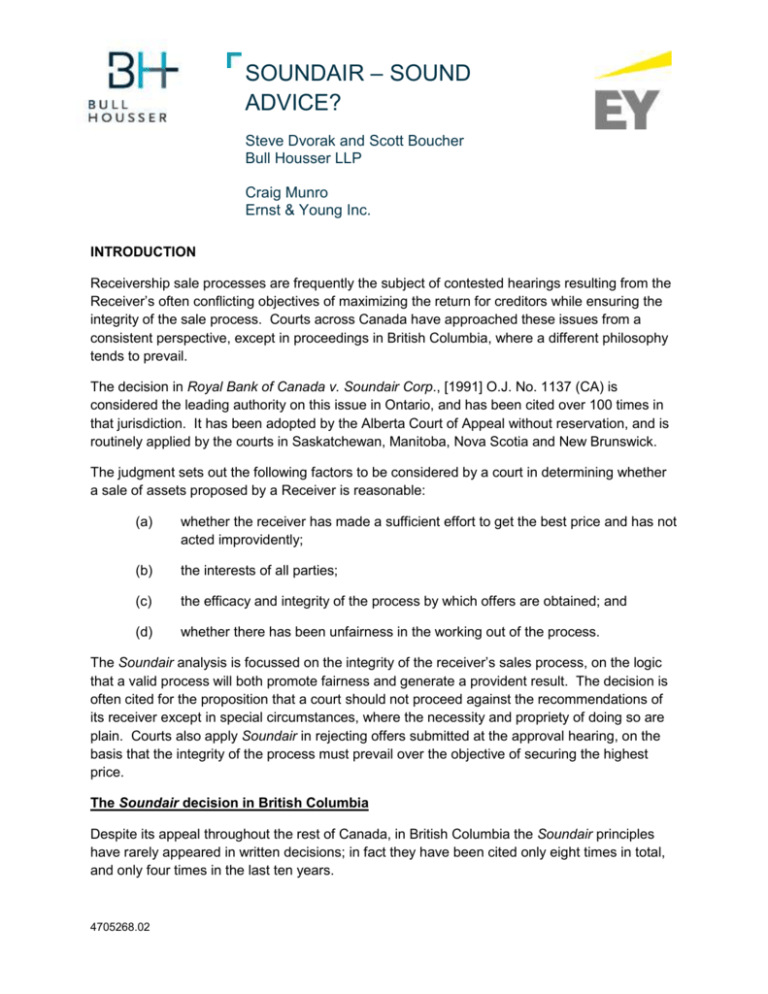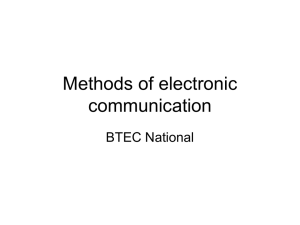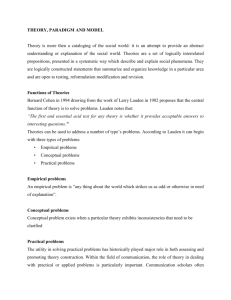Introduction - Bull, Housser & Tupper
advertisement

SOUNDAIR – SOUND ADVICE? Steve Dvorak and Scott Boucher Bull Housser LLP Craig Munro Ernst & Young Inc. INTRODUCTION Receivership sale processes are frequently the subject of contested hearings resulting from the Receiver’s often conflicting objectives of maximizing the return for creditors while ensuring the integrity of the sale process. Courts across Canada have approached these issues from a consistent perspective, except in proceedings in British Columbia, where a different philosophy tends to prevail. The decision in Royal Bank of Canada v. Soundair Corp., [1991] O.J. No. 1137 (CA) is considered the leading authority on this issue in Ontario, and has been cited over 100 times in that jurisdiction. It has been adopted by the Alberta Court of Appeal without reservation, and is routinely applied by the courts in Saskatchewan, Manitoba, Nova Scotia and New Brunswick. The judgment sets out the following factors to be considered by a court in determining whether a sale of assets proposed by a Receiver is reasonable: (a) whether the receiver has made a sufficient effort to get the best price and has not acted improvidently; (b) the interests of all parties; (c) the efficacy and integrity of the process by which offers are obtained; and (d) whether there has been unfairness in the working out of the process. The Soundair analysis is focussed on the integrity of the receiver’s sales process, on the logic that a valid process will both promote fairness and generate a provident result. The decision is often cited for the proposition that a court should not proceed against the recommendations of its receiver except in special circumstances, where the necessity and propriety of doing so are plain. Courts also apply Soundair in rejecting offers submitted at the approval hearing, on the basis that the integrity of the process must prevail over the objective of securing the highest price. The Soundair decision in British Columbia Despite its appeal throughout the rest of Canada, in British Columbia the Soundair principles have rarely appeared in written decisions; in fact they have been cited only eight times in total, and only four times in the last ten years. 4705268.02 2 The authority most frequently cited in connection with receivership sales in B.C. is Westcoast Savings Credit Union v. Wachal, 1988 CanLII 3222 (BCCA). The approach in Wachal, as summarized by the court in Bancorp Income Mortgage Fund Ltd. v. Central Manor Holdings Ltd., 2011 BCSC 126, places the return to creditors, as opposed to the integrity of the process and deference to the Receiver, as the principal objective: [T]he court is primarily concerned with protecting the interests of the creditors [i.e. obtaining the best price for the debtor’s assets]. A second but important consideration is that the process under which the sale agreement is arrived at should be consistent with commercial efficacy and integrity… Through the application of these broadly stated principles, courts in B.C. have rendered judgments that provide conflicting guidance to Receivers and their counsel. A review of reported decisions involving sales proposed by receivers discloses that, for the most part, B.C. courts tend not to refer to Soundair, and in particular do not invoke the call to simply adopt the business judgment of the court’s officer in deciding whether to approve a prospective sale. In fact, only three recent B.C. cases have referred to Soundair: Digital Domain Media Group, Inc. (Re), 2012 BCSC 1567, Moffoot (Re), 2012 BCSC 1005, and Corpfinance International Ltd. v. Earth Energy Utility Corp., 2006 BCSC 1994. In Digital Domain, Fitzpatrick J. was asked to recognize a sale order made in US bankruptcy proceedings, involving the disposition of limited assets located within B.C. In obiter, the judge commented that Soundair is the “…leading authority in Canada with respect to sales of assets”. However, the court did not specifically apply the Soundair principles in recognizing the US order. In Moffoot (Re), a case involving the sale by a trustee of its interest in an action commenced by the bankrupt, the court expressly applied Soundair to reject the proposed sale to a defendant in the action, finding that there would be “unfairness in the working out of the process” if the bankrupt was not afforded the opportunity to have the trustee’s interest in the action conveyed to her for the same consideration. In Corpfinance, a receiver applied for approval of a settlement agreement in connection with an action involving the debtor. The court noted that the receiver was specifically charged with the responsibility to investigate the facts and background underlying the lawsuit, to obtain legal opinions as to the likelihood of success of the various aspects of the lawsuit, consider the cost of proceeding with the lawsuit, consider the commercial reasonableness of the settlement proposed, and to consider the interests of both parties, including the potential unfairness to either party. The court found that the receiver had discharged its responsibilities in accordance with the law as set out in the Soundair case, and that its recommendation was reasonable. Cases in which the Soundair principles have not been referred to include the following representative decisions, which illustrate both an inconsistency in the approach to receiver sales in B.C., and a consistent reluctance to simply adopt the recommendations of the court’s own officer. 4705268.02 3 1. British Columbia v. Baron Enterprises Ltd., 2000 BCCA 317 In considering a challenge to the integrity of a court ordered sales process, the Court of Appeal cited Wachal with approval, and noted that where there is uncertainty whether a late bid should prevail, the “usual course is to order sealed bids” [emphasis added]. The court cited with approval the practice followed in Royal Bank v. Derco Industries Ltd. 1998 CanLII 3015, where a receiver sought approval of a later, marginally higher offer than the offer it had originally accepted, and which was subject only to court approval. In refusing to approve either offer, the court in Derco concluded that the parties should be permitted to submit sealed bids: “Looking at all the evidence, I am unable to say this is a situation where I should accept either bid. They are too close for me to be certain that fairness dictates the higher or the lower offer should succeed. Therefore, I order there be a process of presenting sealed bids in open court by both parties. The highest or any bid will not necessarily be accepted.” The Court of Appeal therefore remitted the matter for the submission of sealed bids. In doing so, it made the following observation: “…a receiver’s decision to enter into an agreement for sale subject to court approval should not be set aside “simply because a later and a higher bid is made”. I do not disagree with that point of view provided it is applied within reasonable limits. Where the later offer is higher, the court may refuse to entertain it and approve the sale recommended by the receiver or other person given conduct of sale. But in practice, that is done only where the improvement on the price is not significant…” [emphasis added]. The resulting principle, then, is that a late but “significantly” higher offer should be accepted by the court, regardless of the receiver’s views. However, this approach is not uniformly followed, as is illustrated by other decisions referred to in this survey. 2. Gene Drennan Ltd. v. Med Grill Ltd., 2001 BCSC 117 Coming less than a year after the Baron Enterprises decision, this case represents the B.C. high water mark of adherence to the original sales process in the face of a superior late offer. Drennan, a court appointed receiver, solicited sealed bids for a restaurant operation, and stipulated a deadline for receipt of bids. An offer submitted in accordance with the specified bid process was selected, subject to court approval. Before the hearing date, an unsuccessful bidder submitted an offer more that 20% above the accepted offer. The receiver rejected that higher offer and sought approval of the accepted offer. At the hearing, the court rejected an application by secured creditors to force a sealed bid auction, ruling that the receiver had run a fair process, and that the integrity of the process required that the compliant, though lower, bid be approved. While the court did not refer to Soundair in its reasons, the element of deference to a receiver, as expressed in the Nova Scotia Court of Appeal decision in Cameron and the Bank of Nova Scotia (1981), 38 C.B.R. (N.S.) 1, was adopted: an accepted offer should not be cast aside 4705268.02 4 simply because a later, higher offer has been submitted, as to do so would “…literally create chaos in the commercial world [as] receivers and purchasers would never be sure they had a binding agreement.” 3. Sun Life Savings and Mortgage Corp. v. Sampson, 1991 CanLII 588 (B.C.S.C.) This decision arose in the context of a residential foreclosure, and therefore its comments respecting sales processes in commercial settings, including a reference to Soundair, are not directly applicable to a commercial receivership. However, it is notable for its comprehensive review of the prevailing approaches, and in particular the observation that a sales process directed by court order is least likely to be subject to alteration or to suffer the consideration of out of time offers. 4. Cox v. Crystal Graphite Corp., 2006 BCSC 984 (upheld at 2008 BCCA 475) The court approved the receiver’s proposed sale under a late, but superior, bid, citing the principles from Wachal in support. The court considered the statements made in the Gene Drennan decision with respect to the integrity of the process, but found that the process was not unfair in these circumstances. In arriving at this conclusion, the court gave considerable weight to the fact that the receiver’s form of offer contained the usual provision that the court may accept late bids, and that the receiver’s obligation was restricted to placing the accepted offer before the court. 5. Forest & Marine Finance Co. (Re), 2009 BCSC 1781 The court approved the realization plan proposed by the receiver, over the objections of a creditor who argued that the receiver should immediately liquidate the debtor’s assets. The court did not refer to any case law in its decision, but observed that the usual approach is for courts to be reluctant to second guess the recommendations of a receiver. 6. Darroch Investments Ltd. v. 0713887 B.C. Ltd., 2009 BCSC 936 The court dismissed the receiver’s appeal of a Master’s decision that rejected a sale proposed by the receiver. While there was no appraisal evidence, and the assets had not been exposed to the market, the sale was supported by the receiver’s opinion that the offer was provident based upon established capitalization rates. The court, in agreeing with the Master’s decision to reject the sale, found that: “On the whole, my view is that the property should be exposed to the market and that it would be best for the court to have an appraisal of the value of the property before the court is asked to approve an offer to buy it.” The court did not refer to any principles or case law in coming to this decision, nor did the court make any statements concerning the deference accorded to the business judgment of receivers. 4705268.02 5 7. Bancorp Income Mortgage Fund Ltd. v. Central Manor Holdings Ltd., 2011 BCSC 126 (Master). The Court approved a proposed sale by the receiver of a hotel operation, supported by the senior secured creditor, over the objections of subordinate secured creditors who took issue with the receiver’s marketing efforts (which did not involve the engagement of a commercial realtor). In approving the sale, the court noted that it is primarily concerned with protecting the interests of the creditors, with a secondary consideration being that the process should be consistent with commercial efficacy and integrity. This reasoning is consistent with the guidance provided in Wachal; however, the master cited no B.C. decisions, relying instead upon the Ontario case of Re Selkirk, (1986), 58 C.B.R. (N.S.) 245 (Ont. H.C.). 8. Bank of Montreal v. Kamlands Holdings Ltd., 2011 BCSC 1262 The court approved the receiver’s proposed sale of real property, even though the purchase price was 50% of the previous year’s listing price. In doing so, the court concluded that it was necessary to defer to the business judgment of the receiver, without specifically citing any authority for that proposition. While the court expressed its willingness to defer to the receiver’s “business judgment”, this was likely facilitated by the fact that the receiver’s recommendations were supported by recent appraisal evidence. Observations A survey of the authorities from each jurisdiction suggests that courts in Ontario and B.C. have distinct approaches when considering sales in receivership proceedings. In the past ten years the Soundair principles, so central to the Ontario experience, have received limited comment, and only rare specific application, in B.C. Courts in B.C. have demonstrated little interest in systematically deferring to a receiver’s business judgment, and instead have focused upon the unique circumstances of each case to assess the appropriateness of a proposed sale. Apart from the Forest & Marine, Kamlands and Corpfinance decisions, the principle of deference is rarely expressly invoked in B.C., and the prevailing concern, drawn from Selkirk and Wachal, is to obtain the best possible recovery for creditors. The integrity of the process is expressed to be of secondary concern, and therefore courts in B.C. are more open to approving bids that are non-compliant or otherwise not recommended by a receiver, and directing that sealed bids be submitted where there is competing interest in the assets. This approach has arguably resulted in a lack of commercial certainty in B.C. receiverships, and has, in the experience of the authors, affected the willingness of purchasers to submit an initial offer. Frequently a first offer is strategically submitted for a discounted amount, allowing the offeror to raise its price if a further bidding process is directed by the court. If a bidding process is not ordered, the purchaser benefits, at the expense of creditors. In addition, purchasers are reluctant to perform the due diligence necessary to provide the receiver with a binding offer (subject only to court approval) if they believe there is a risk that another party will “outbid” them at the court approval hearing. As a result, there has been a trend in B.C. toward the use of termination fees to protect the position of the initial offeror. This 4705268.02 6 tool has been accepted by the courts as a reasonable accommodation, provided that the quantum and use of the fee are substantiated. Evidence supporting the fee (including the due diligence costs incurred by the purchaser, the quantum of the fee relative to fees approved in other cases, and any factors specific to the assets in question) should be provided in each case. An alternative is to seek court approval of a defined sales process, as any deviation from that process is unlikely to find much support from the court at the approval hearing (as noted in the Sunlife decision, supra). This approach is not without drawbacks, including timing issues, a loss of flexibility and increased cost, but if the nature of the assets demands a higher level of procedural certainty, this option should be considered. The approach in Ontario has much to commend it. Upholding the integrity of the process and maximizing the return to creditors are not mutually exclusive objectives, but in B.C. the approach to balancing these considerations - through sealed bids - can lead to inefficiency, uncertainty, and potential inequity. The consistent application of the Soundair principles, including in particular deference to the business judgment of the court’s own officer, support confidence in the receivership process. That said, a market economist might argue that whether the court favours a system which rigidly honours the integrity of the sales process over one that favours maximizing returns to creditors, the results over time should be the same. There is no way to empirically determine if one approach is superior to the other, and accordingly the authors are unable to substantively recommend one over the other. However, stakeholders should be aware of the differences, and are invited to consider whether there is any benefit to ensuring that a uniform approach is applied in all receiverships. The cases referred to in this paper can be found on the Bull Housser LLP website at http://bht.com/events/steve-dvorak-present-cba-insolvency-subsection. 4705268.02







